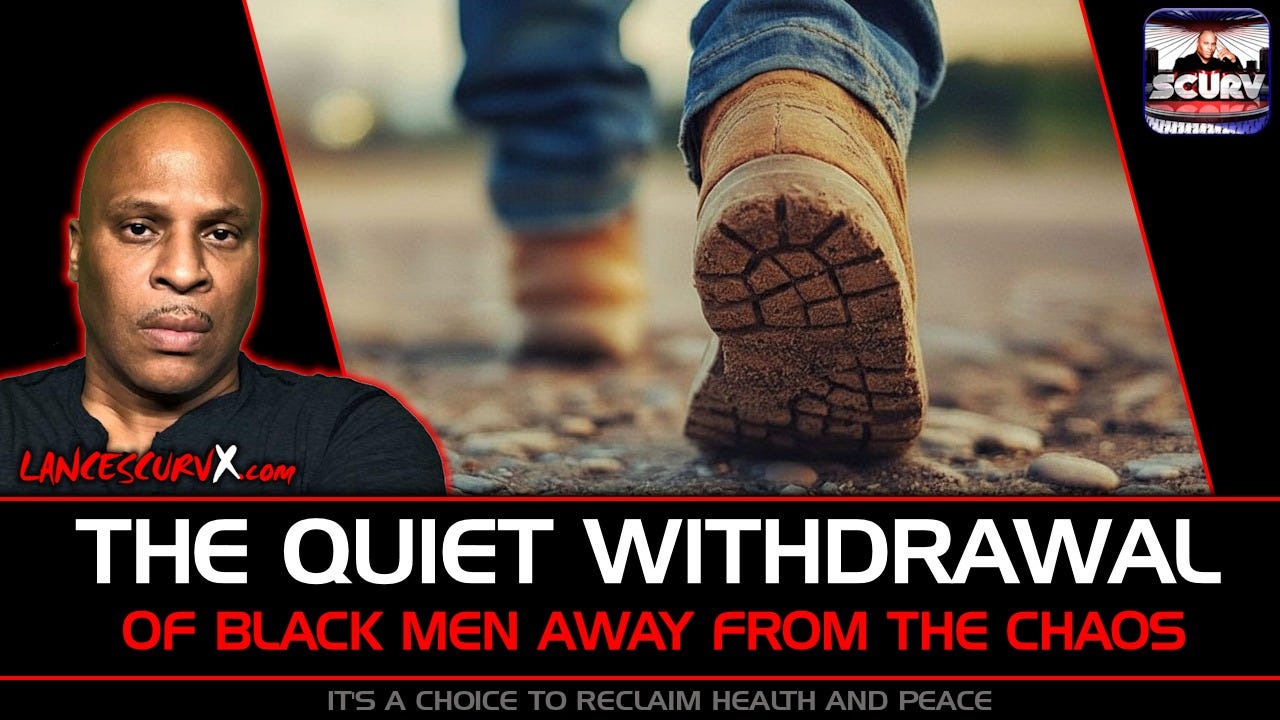Right now, a lot of Black men in America are quietly stepping back from the world’s expectations. There are no protests, no riots — just silence. Men are realizing that the path society promised them — success, respect, and stability — often comes at the cost of their peace, mental health, and happiness. This LanceScurv piece breaks down why so many Black men feel trapped, the pressures they face, and the steps they are taking to reclaim their lives, redefine success, and find true freedom on their own terms.
Bulleted Points and Explanations
1. The Quiet Withdrawal
Many Black men are slowly disconnecting from society’s demands. This isn’t laziness — it’s a choice to protect their health and peace.
Instead of joining protests or causing drama, they are quietly stepping back, whether at home, in their communities, or in everyday life. This is their way of taking control of their own lives in a world that often asks too much and gives little in return.
2. Pressure to Be a “Man”
From a young age, Black men are taught to be tough, strong, and providers. They are told never to show weakness, always to succeed, and to keep going no matter what.
These rules can feel impossible. They tie a man’s value to money, jobs, and what he can give to others. When life doesn’t reward that hard work, the stress becomes overwhelming.
3. Moving Goalposts of Success
Society now expects men to be emotionally available, nurturing, and equal partners — on top of all their old responsibilities.
This mix of old and new expectations can be exhausting. Black men often feel like they must work twice as hard to meet impossible standards while still trying to take care of family and community.
4. Economic Hardship
Stable jobs that built the middle class are disappearing. Many men face layoffs, automation, and low-paying jobs.
Financial stress hits hard in the Black community, increasing anxiety and making it harder to maintain mental and emotional health. It’s no wonder some men quietly check out to survive.
5. The “Man Box” Trap
Men are taught to hide their emotions and always “perform” strength. Vulnerability is often seen as weakness.
This constant act of being tough wears a person down. Depression, anger, and isolation often go unnoticed because society expects men to bear it alone.
6. Isolation and Loneliness
Many Black men have few people they feel they can trust with their struggles. They are less likely to seek support from friends or family.
Yet solitude, when embraced intentionally, can be powerful. It allows men to reconnect with themselves, their interests, and their priorities, building strength from within.
7. The Disposable Man
Black men are often expected to sacrifice themselves for others — in jobs, in families, in society. Their lives can feel “expendable.”
This teaches men that they are valued only for what they do, not who they are. Recognizing this is part of stepping back and taking control of one’s life.
8. Social Media Pressures
Platforms show impossible images of success and masculinity. Black men are compared to curated lives that few can match.
The result is stress and frustration. Choosing peace over performance helps men step off the treadmill of constant comparison.
9. Choosing to Stop Playing the Game
The quiet rebellion begins when men decide not to play by a rigged system’s rules.
This choice isn’t giving up — it’s taking care of their mental health and protecting their lives from a system that asks too much for too little.
10. Redefining Winning
Winning isn’t about money, possessions, or status. It’s about wanting less, living simpler, and prioritizing peace.
Black men are learning that true success comes from controlling their time and energy, choosing commitments that bring meaning, not just appearances.
11. Finding Strength in Solitude
Being alone doesn’t have to feel bad. Solitude gives space to think, grow, and enjoy life without pressure or judgment.
Men can rediscover hobbies, passions, and values, building mental and emotional strength that society rarely allows them to develop.
12. Authenticity Over Performance
Men often wear masks to appear strong or successful. The quiet rebellion is about taking those masks off.
When men are honest with themselves and a few trusted people, relationships deepen. It’s better to have a few real connections than many shallow ones.
13. Choosing Simpler Lives
Some Black men leave high-stress jobs, move to smaller towns, or pursue passions instead of chasing society’s version of success.
Though this may seem like “falling behind,” these choices allow men to live freer, happier lives with purpose and satisfaction.
14. Independence and Self-Mastery
This rebellion is about taking life into your own hands, not rebelling against others.
Men gain power by living for themselves, not society. True independence comes from peace, integrity, and freedom from external validation.
15. Life Beyond the Game
Life after stepping away is calm and full of small joys — a cup of coffee, a walk, or real conversations.
For Black men, this is about reclaiming their time and peace. It’s realizing that personal freedom, not status or applause, is the most important victory.
The quiet rebellion of Black men in America is one of the most important social shifts happening today. It’s not about giving up — it’s about taking life back, protecting mental health, and creating meaning on your own terms. By embracing solitude, redefining success, and living authentically, Black men are carving out lives of peace, purpose, and independence. This movement reminds us that real strength is not about proving the world wrong — it’s about proving to yourself that your life, your peace, and your choices matter above all else.













